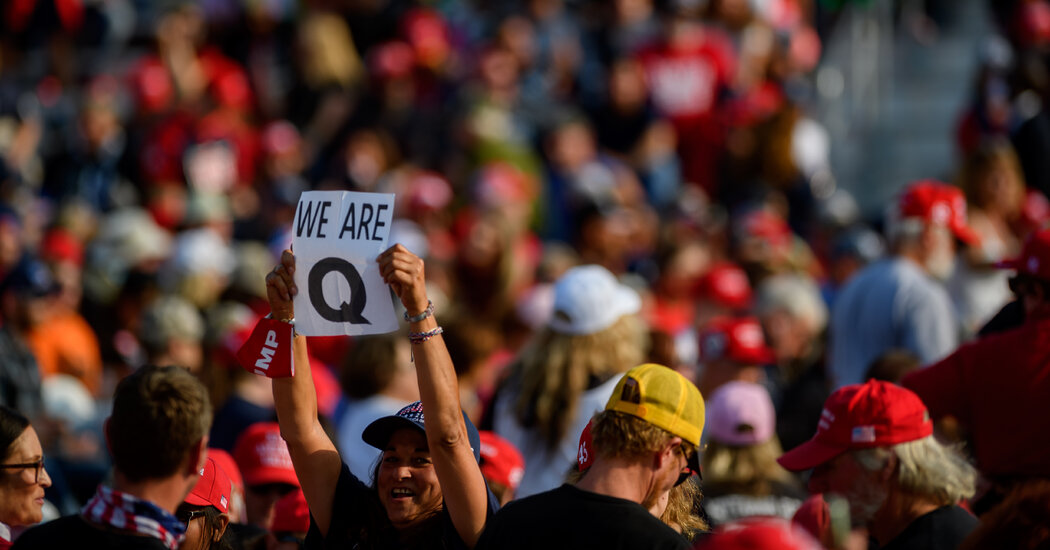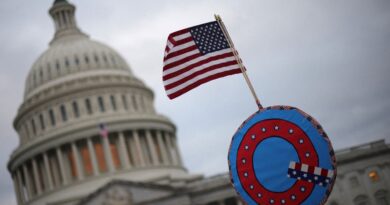Opinion | The QAnon Delusion Has Not Loosened Its Grip

Douglas, in an email, wrote that “people are attracted to conspiracy theories when important psychological needs are not being met.” She identified three such needs: “the need for knowledge and certainty”; the “existential need” to “to feel safe and secure” when “powerless and scared”; and, among those high in narcissism, the “need to feel unique compared to others.”
Uscinski and two collaborators, in their 2016 paper, “What Drives Conspiratorial Beliefs? The Role of Informational Cues and Predispositions,” describe how they identify likely conspiracy believers by asking respondents whether they agree or disagree with the following statements:
“Events like wars, the recession, and the outcomes of elections are controlled by small groups of people who are working in secret against the rest of us”; “Much of our lives are being controlled by plots hatched in secret places”; “Even though we live in a democracy, a few people will always run things anyway”; “The people who really ‘run’ the country, are not known to the voters.”
Believers in conspiracies will often automatically dismiss factual claims disputing their beliefs. Jovan Byford, a senior lecturer in psychology at the Open University in England, makes the case that
Conspiracy theories seduce not so much through the power of argument, but through the intensity of the passions that they stir. Underpinning conspiracy theories are feelings of resentment, indignation and disenchantment about the world. They are stories about good and evil, as much as about what is true.
Byford continues:
Lack of evidence of a conspiracy, or positive proof against its existence, is taken by believers as evidence of the craftiness of those behind the plot, and their ability to dupe the public.
There are five common ingredients to conspiracy theories, according to Jan-Willem van Prooijen and Mark van Vugt, professors of psychology at the Vrije Universiteit Amsterdam, in their paper “Conspiracy Theories: Evolved Functions and Psychological Mechanisms.”
First, they write,
Conspiracy theories make an assumption of how people, objects, or events are causally interconnected. Put differently, a conspiracy theory always involves a hypothesized pattern. Second, conspiracy theories stipulate that the plans of alleged conspirators are deliberate. Conspiracy theories thus ascribe intentionality to the actions of conspirators, implying agency. Third, a conspiracy theory always involves a coalition, or group, of actors working in conjunction. An act of one individual, a lone wolf, does not fit the definition of a conspiracy theory. Fourth, conspiracy theories always contain an element of threat such that the alleged goals of the conspirators are harmful or deceptive. Fifth, and finally, a conspiracy theory always carries an element of secrecy and is therefore often difficult to invalidate.
Van Prooijen elaborated on his analysis in an email:
Conspiracy theories are a powerful tool to demonize opposing groups, and in extreme cases can make people believe that violence is necessary. In this case (Jan. 6), the crowd clearly believed that the elections were stolen from their leader, and this belief incited them to fight for what they believed was a just cause. Most likely the conspiracy theories make them perceive themselves as a sort of “freedom fighter.”
Van Prooijen sees conspiracy thinking as deeply rooted in the evolutionary past.
Our theory is that conspiracy theories evolved among ancestral humans to prepare for, and hence protect against, potentially hostile groups. What we saw here, I think was an evolutionary mismatch: some mental faculties evolved to cope effectively with an ancestral environment, yet we now live in a different, modern environment where these same mechanisms can lead to detrimental outcomes. In an ancestral world with regular tribal warfare and coalitional conflict, in many situations it could have been rational and even lifesaving to respond with violence to the threat of a different group conspiring against one’s own group. Now in our modern world these mechanisms may sometimes misfire, and lead people to use violence toward the very democratic institutions that were designed to help and protect them.
Why, I asked, are Trump supporters particularly receptive to conspiracies? Van Prooijen replied:
For one, the Trump movement can be seen as populist, meaning that this movement espouses a worldview that sees society as a struggle between ‘the corrupt elites’ versus the people. This in and of itself predisposes people to conspiracy thinking. But there are also other factors. For instance, the Trump movement appears heavily fear-based, is highly nationalistic, and endorses relatively simple solutions for complex problems. All of these factors are known to feed into conspiracy thinking.
The events of Jan. 6, van Prooijen continued,
underscore that conspiracy theories are not some “innocent” form of belief that people may have. They can inspire radical action, and indeed, a movement like QAnon can be a genuine liability for public safety. Voltaire once said: “Those who can make you believe absurdities, can make you commit atrocities” — and he was right.
This article has been archived for your research. The original version from The New York Times can be found here.


